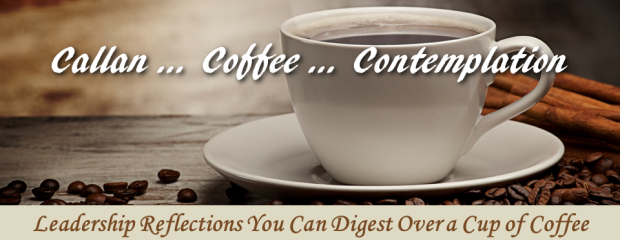Callan…Coffee…Contemplation for the week of May 5th
Holding Tension
Leadership is inherently stressful. Stress creates anxiety and tension within the leader and also within the groups we lead. This sense of tension is even more pronounced today due to social media, 24-hour news cycles, and the constant connectedness of modern living. Because “high anxiety” is a natural state of modern life I believe leaders need to be acutely aware of this fact: The higher one moves up in leadership responsibility and position, the greater the need for that leader to be able to hold anxiety and tension. A leader must live in the midst of the anxiety and, through disciplined self-regulation, make wise decisions while holding the tension. Too often leaders react to tension with a fight-or-flight mode, and when they do–they implode. When leaders lose their ability to self-regulate they emit a toxic by-product in the form of bankrupt, weak, and undisciplined behavior. Great leaders develop an ability to hold tension and govern themselves effectively in a whirlwind of anxiety, much like a seasoned skipper at the ship’s controls on a roiling sea.
A Necessary Teacher
Watching TV recently, I decided to count the number of commercials focusing on some form of pain relief or self-help gimmick. I stopped counting after twenty. This observation made me realize we have very little tolerance for temporary failure, inconvenience, or pain. Now to be clear–I am not suggesting anyone welcome these things with open arms; however, I do believe there is such as thing as necessary failure and necessary pain. We often fail, or feel pain, because we are off track, off balance, or somehow misaligned with a healthy course of living. I have found the wise aphorism, which states “wherever you fall, there lies your teacher”–to be so true and so full of wise counsel. Failure, properly understood, often transforms us if we allow ourselves to be open to its lessons. Failure is a necessary teacher. In our society, though, we often don’t tolerate temporary pain or discomfort long enough to learn its lessons. If we can cultivate hardiness and resilience in ourselves, and trust the temporary pain of setback or loss, we just might avail ourselves to the lessons we need most to hear and see.
Initiation
As a young boy, I enjoyed reading about Native American warriors. One facet I really admired was their tradition of rites of initiation. This warrior society understood that young men would not naturally move beyond adolescence, beyond their self-centered private worlds, without being ritually forced to do so. Something had to be done “to them” to force the break from adolescence and invite movement into responsible adulthood. Sometime during a young warrior’s teenage years, he’d be forced to go on a quest—literally breaking out of the normal tribal life—and seek his new identity in the barren plains or desert. And interestingly, he was often mentored in this quest by his uncle or another wise elder in the group, someone whom had made a similar quest in the past. These rituals of initiation were the means through which the society ensured the creation of wise and responsible elders. Today, I reflect on our society and wonder: how can leaders rekindle this need for healthy initiation and rites of passage to guide emerging leaders in their growth and to create within our society a reservoir of wise elders?
Travel
When I was in high school I had a teacher who constantly extolled the benefit of travel. He implored us to do whatever it took, throughout our lives, to regularly break the rhythm of our routines and see the larger world. Looking back I see his advice not only for its basic wisdom, but interestingly, also for its relevance to leadership. Here’s why: Traveling removes us from our parochial views and through exploration of new places, cultures, and challenges, helps us see things through a larger, more expansive lens. I honestly can’t name one leader whom I would call truly exceptional who did not possess such an expansive view, and with it, an ability to see the great and enduring patterns of history, and then lead out of this elevating mindset. This wanderlust—a natural desire to wander, explore, and see the larger world—is one of the surest ways leaders can learn to see in new ways and capture larger horizons. Traveling is much like reading history: it creates an expansive paradigm through which leaders gain a clear(er) vision of ones life, purpose, and a commitment to heroic aspiration.
Expectation
On my desk at work I keep a quote attributed to Plains Indian Warriors whom, as legend has it, reportedly started their day with the following exhortation to their sons: “Today is a good day to do great things.” I keep this quote within easy glance because it reminds me of the daily need to retain positive expectation. I increasingly find at the heart of great leadership and championship performance is an unquenchable expectation for great things. Without soaring ambition, without majestic expectation, our default set point often devolves to inertia and doing things as we always have. Status quo, even when destructive and depressing, can become strangely comfortable when it becomes routine. Great leaders expect excellence and are stirred by heroic impulses. We need some great cause, some majestic purpose, that calls forth from us the hero within. And for the groups we lead, we need to point to a future end state similarly defined by elevating and grand ambition. So….master the day. Today, and everyday, is truly a good day to do great things.
Check back next Monday for a round up of this week’s social media shares. Or check us out on Facebook, Twitter, Google+, or Pinterest to see our posts every day!
Tweet Share






